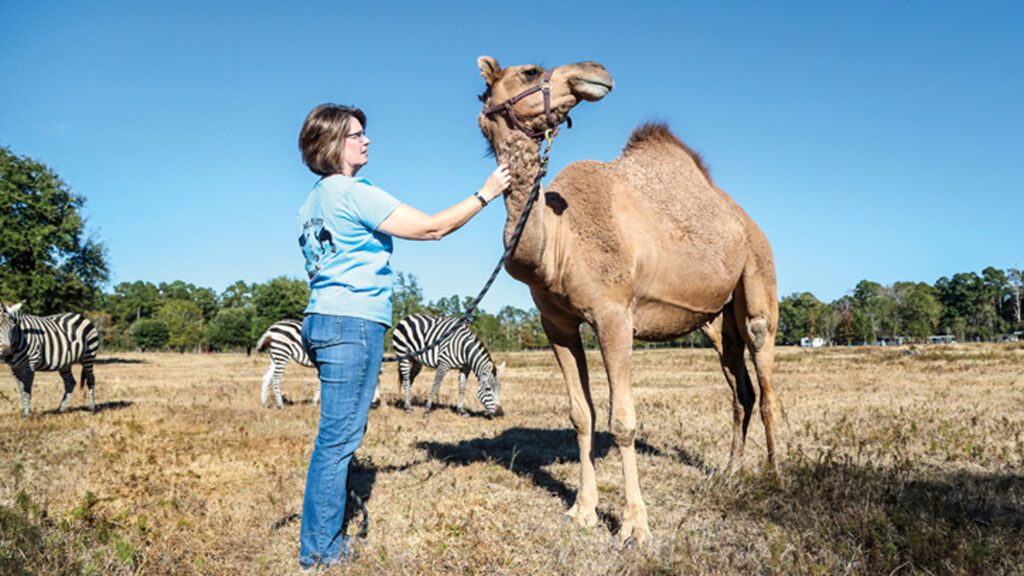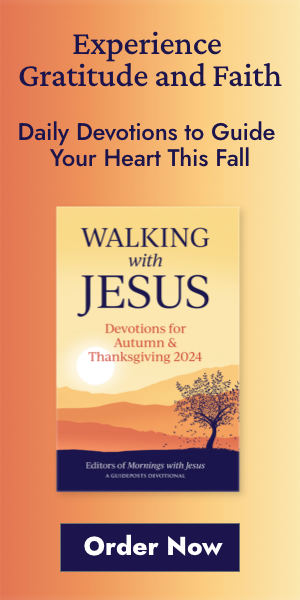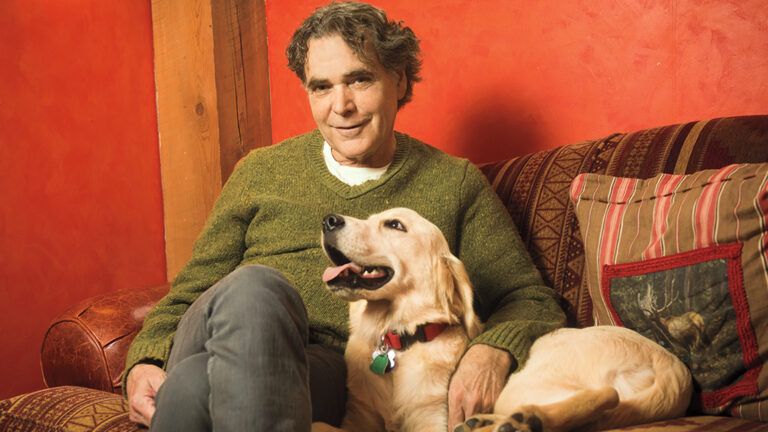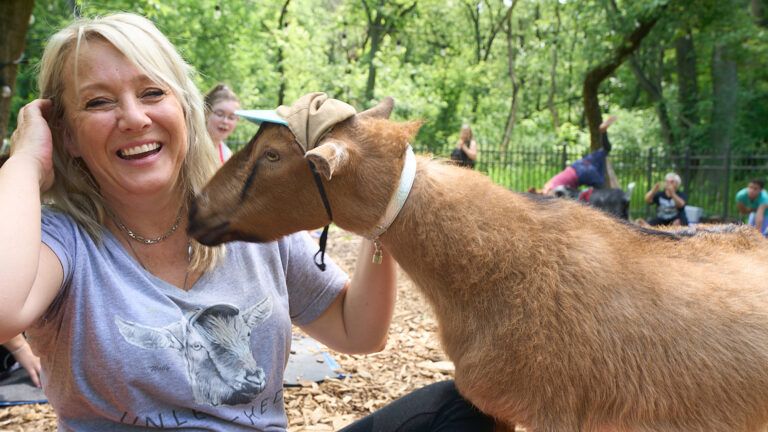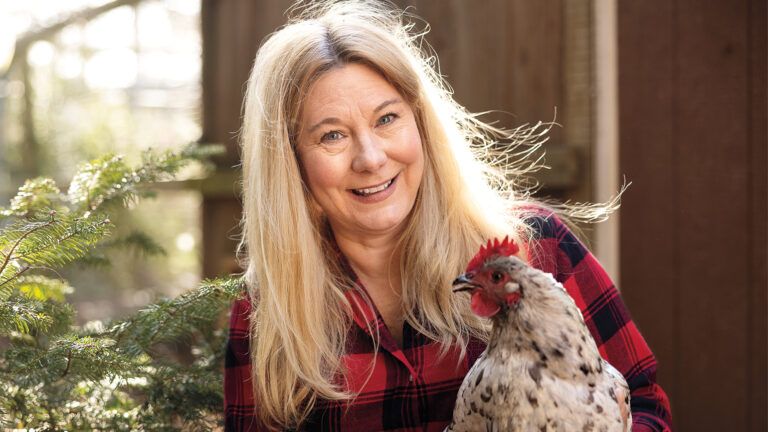It’s feeding time on the farm. Our two camels, Sybil and Nadia, trot over to their individual feed buckets when they see me coming. “Hello, pretty girls,” I say, reaching up to pet their necks. Sybil nuzzles me; she loves being close. “Steady,” I tell her, which prompts her to stay. I hook each girl up to a lead rope to keep them in place until they finish eating. Then I set them free and they mosey off into the pasture. I marvel at how docile and obedient they are.
Caring for these two camels has been an unexpected joy for me. Feeding, bathing (can you imagine giving a 1,000-pound camel a bath?) and grooming them—it’s given us time to bond. We’ve learned a lot about one another over the past seven years since they joined my husband, Ron, and me on our 90-acre spread, land that his great-grandfather had settled in the 1890s. I’ve taught our camels how to stay on our property and how to listen. I hope I’ve taught them what it feels like to be loved. What they’ve taught me has surprised me—lessons that will stay with me forever.
God Puts Beauty All Around Us
I couldn’t believe my ears when Ron, a traveling emergency medicine physician, turned to me one night and said, “Honey, I bought us two camels! You can’t imagine how beautiful they are.” Growing up on a farm in Oklahoma where we raised Hereford cattle and sheep, I’d always been an animal lover. But camels? They were intimidating, odd-looking and stinky. Beautiful was not a word I would have ever used to describe a camel. That was before I got to know one.
We brought Nadia and Sybil home when they were only three months old. We spent a lot of time with them and hand-fed them for months until they got to know us. Dromedary (one-humped) camels weigh more than 70 pounds at birth, so I couldn’t exactly snuggle them in my arms while I fed them, but as I looked into their soft brown eyes, fringed by two rows of the longest lashes, I sensed how vulnerable they were. They depended on me completely to take care of them. Without meaning to, I fell in love.
As the girls got older, I grew to appreciate their distinct personalities. I’d named them Nadia, meaning “first” in Arabic, and Sybil, which means “beautiful eyes” in Arabic. True to their names, Nadia seems to know she’s the firstborn and has assumed the role of matriarch. And Sybil’s eyes have always captivated me—it’s as if she’s talking to me through them.
Both camels delight in having their picture taken, and when visitors come with cameras, they run to greet them. They are especially gentle around children, but with us, they’ll sometimes playfully nip or snatch Ron’s hat. Camels are intelligent, perceptive, loyal—and yes, beautiful—creatures.
The first time Ron took me to see the 90 acres he’d inherited, I was shocked. I’d expected rolling pastures and graceful trees, but what I saw was more like a jungle—overgrown and ugly. I couldn’t imagine animals grazing here or us living in the small cottage on the property. Then Ron and I started clearing the land.
We bought a herd of Longhorn cattle that ate the brush, and we worked every day from sunup to sundown, collapsing in bed each night so exhausted we could barely speak. The farm is still a work in progress, but we have 40 acres of pasture cleared for our camels, horses, donkeys, zebras, Longhorns and chickens. When I look at what we’ve built, it amazes me.
You Are Stronger Than You Think
Nadia once gave birth to a male calf that lived only a short time. It broke my heart to hear her throaty bellow as she mourned the loss of her baby. After a week, Nadia went back to eating and roaming the pasture as usual. I can’t know how she felt inside, but the strength she showed after her loss left a deep impression on me. She eventually had a healthy calf named Amara, who also lives on the farm.
When Sybil was only a year old, she became very sick with a brain worm. We transported her to the Large Animal Hospital at Texas A&M, three hours away. The vets were able to save her with high doses of steroids and antiparasitic drugs, grueling treatments that Sybil bore patiently.
Last fall, at age seven and pregnant with her second calf, Sybil was diagnosed with a dislocated hip, a condition that is usually fatal in such a large animal. I could see the agony in her eyes, but she held on through the pain during the trip back to A&M, where we knew she’d have the best chance of survival.
After a successful surgery that beat the odds, Sybil endured months of rehab and confinement. I was awed by her fortitude and will to live. She even charmed the hospital team, who threw her a baby shower. When she was finally able to come home and run free, we shared her joy.
In 2016, Ron’s non-Hodgkin’s lymphoma recurred after he’d been in remission for 15 years. We were both devastated. For six months he underwent intensive chemotherapy and radiation treatments that left him weak and unable to work. I took on sole responsibility for caring for the animals. Hefting 50-pound sacks of feed aggravated my back. Maintenance of the animals was a 24/7 operation, in addition to keeping our household running and lifting Ron’s spirits.
I was drained mentally and physically and didn’t think I could keep it up. But Nadia and Sybil reminded me that there’s a strength within us that carries us through even the toughest of times. Thankfully, Ron is in remission again and is active and feeling well.
There’s Always Hope
I went through a period when I lost all hope. It started with my first husband, the father of my two boys, abruptly asking for a divorce. That was the end of not only my nine-year marriage but also my long-held dream that we’d take over my family’s farm in Oklahoma. On the rebound, I married a man who turned out to be abusive. I feared for my life and the lives of my sons. By the time I finally got out of that marriage, I had hit rock bottom.
One day in a crowded restaurant, a handsome man offered me his table. Instead of leaving, he said, “I’m Ron McMurry and you look like someone I’d love to know.” We chatted a bit—he was also divorced with children—and continued our conversations over email in the evenings after our kids were in bed. He won me over with his kindness and wit.
When Ron asked me to marry him less than a year after we met, I was worried about making another mistake. Still, in my heart, I knew he was different. I said yes, and we moved to Texas, where he had a farm—not the farm I’d pictured, but the farm God intended me to have.
Yet it wasn’t until I watched Nadia and Sybil live through darkness and come out on the other side that I realized that even during those difficult—and sometimes scary—years, there had been hope for me. Through the loss and medical issues our camels endured, I had always held hope for their recovery and happiness. Just as God had always held hope for mine.
Now, between animal feedings and farm chores, I sit contently in our cozy cottage, more at peace than I’ve ever been. Sybil’s calf will be born this spring. What better reason for hope than new life? I thank God—and Ron—every day for bringing me these camels. They’re truly a gift.
Did you enjoy this story? Subscribe to All Creatures magazine.
